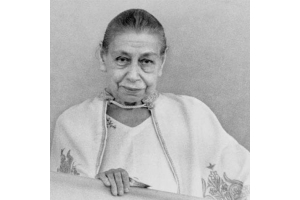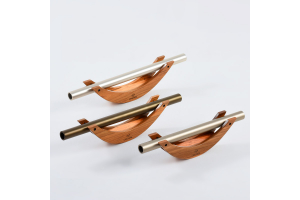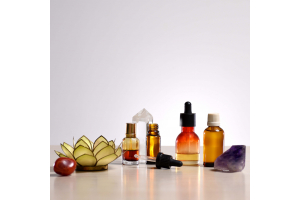Dr. Be's Ayurvedic Recommendations for the Rainy Season

Monsoon is knocking - or rather pattering - on our door, and with this influx of rain comes all the things we love, and love to hate, about this season. Whether it is the solace of a cosy evening with a cup of chai or the all-too familiar musty smell that we cannot shake from our clothes, monsoon is what we make it.
We are beings of our environment, and as the seasons change, what’s happening inside our body also changes. To support the physical body in this time of year, we share with you some of the ancient wisdom that Ayurveda has to offer on how you can make this monsoon work for you!
Meet the Lovely Dr. Be
For our Ayurvedic needs, we turn to Berengere or ‘Dr. Be’, who is Auroville’s very own Ayurvedic Doctor. She studied Ayurvedic Medicine in Jamnagar, at the Gujarat Ayurved University for 6 years. She then joined Auroville in 2013, and has been practicing Ayurveda for 15 years now.
In its basic principles, she describes Ayurveda as a search for a balance between different qualities: “In Ayurveda, we are very practical. What you see, feel, smell, taste, touch can be used and can be described using qualities. These qualities, depending on if you feel like there is an excess or not enough of it, can be reversed by providing someone with substances that are the opposite quality. So during the monsoon, what is happening? Lots of water, lots of humidity, lots of fungus, not enough light for the sun to dry everything. The basic principle is that now we need to bring fire, dryness and astringency into and for our bodies. So anything that we know of that can bring these qualities into our life is what is needed for monsoon.”
Staying dry and warm is key here. “The recommendation would be to cover your throat, and always wear socks inside. This is because the dampness and the coldness come directly from the ground through your feet. And now for food: during this time, the digestive fire is not as powerful as usual. We might observe that as soon as we eat, we feel full and heavy, or that the digestion is slow compared to normal. That’s because of the dampness. So we are going to give spices to the body that will stimulate the digestive fire, and that also speed up the digestion”
To understand Ayurvedic principles a little better, it's important to know your Dosha. In Ayurveda, it is believed that everybody is made up of three principal energies. These are known as the Doshas. The three Doshas are Vata, Pitta and Kapha. A balance of all three is needed for good health. You can get a sense of what your primary Dosha is through online tests such as this one, or get a more accurate estimation by visiting your local Ayurvedic Doctor for a consultation.
Here is a helpful list of recommendations curated by Doctor Be on what’s gonna work for you and your Dosha during monsoon.
Recommendations According to Specific Dosha
VATA
Irregular, low appetite; can easily skip meals
Irregular digestion, tendency to gas, bloating, constipation
To Favour: sweet, salty, oily, warm, spicy foods
To Moderate: bitter, pungent foods
PITTA
Strong appetite, must eat as soon as feels hungry otherwise becomes irritable
Fast digestion, tendency to have acidity before meals or diarrhoea
To Favour: sweet, bitter, slightly salty, warm, oily, spicy foods
To Moderate: astringent, pungent foods
KAPHA
Low appetite but always wants to snack
Slow, heavy digestion, tendency to produce mucus in throat or stool, post-digestive acidity
To Favour: a little salty, pungent, bitter, warm, a little oily foods
To Moderate: astringent, dry foods

General Food Recommendations for all Doshas
Proteins: Moong Dal, beans, chickpeas, lentils, white meat, egg.
Vegetables: Amaranth, green leaves such as spinach, carrot, beetroot, aubergine, cauliflower, bitter gourd, bottle gourd, moringa (drumstick), chow-chow.
Cereals: Old grains - barley, rice, millet, oat, wheat.
Fruits: Pomegranate, banana, papaya, grape, guava, pear, peanut.
Spices: Ginger, pepper, turmeric, cumin, clove, asafoetida, mustard seed, ajwain, cinnamon, fennel seed, fenugreek seed, onion, garlic.
Cooking Medium: Ghee or sesame/olive/sunflower oil.
Drinks: Herbal teas or warm water, with honey or jaggery.
Ayurvedic herbal supplements: Panchakola, Trikatu, Hingwashtak churna. All can be taken with a little bit of honey.
Foods to Avoid
All fermented food, meaning anything that has yeast/baking soda (bread, pizza, pasta, cakes, biscuits), and soya sauce, cheese, yoghurt, curd, buttermilk, lassi, vinegar, wine, beer.
Too much liquid and drinking during meals
Raw food
Heavy and difficult to digest food (deep fried food, etc)
Coffee (with milk especially)
Chocolate
Ice cream
Sodas
Recommendations for Activities
For activities during monsoon, the overarching principle is that it is a time to stabilize, centre, and revitalize. Be suggests that we:
Keep a regular rhythm for our meals and bedtime.
Massage ourselves with sesame oil under a heat source (warm shower, steam bath).
Take a foot bath with warm salty water.
Wash ourselves with warm water (shower or bath).
Keep the body warm, neck and feet especially.
Do soft physical exercise daily for about 30 minutes a day. Think of Yoga, Pranayama, Meditation/Concentration, Qi-Gong.
Inhale the essence of eucalyptus, neem, or sage. Take either drops of essential oil for inhalation or, if possible, take fresh leaves and boil them to inhale the steam.
Regularly do Abhyanga, where you massage yourself with oil, or take Shirodhara treatment, where warm oil is poured onto the forehead.
Now that you have all the information on the do’s and don'ts of the rainy season, courtesy of Doctor Be, we hope you can relax and enjoy all that is magical about the monsoon!





